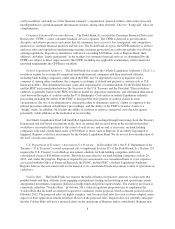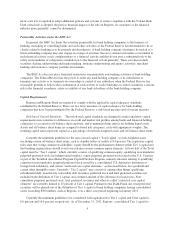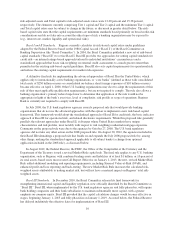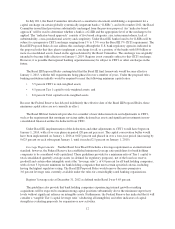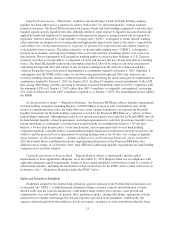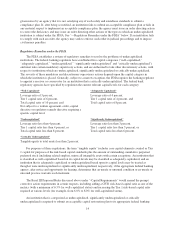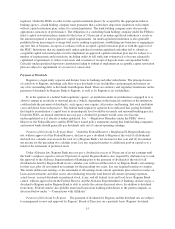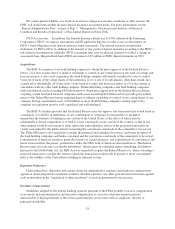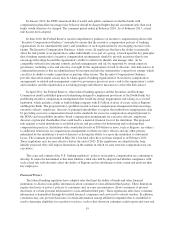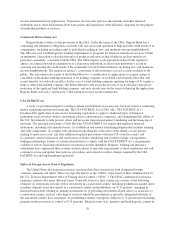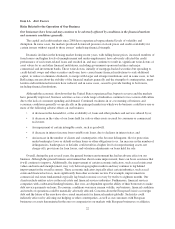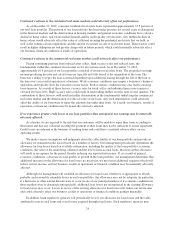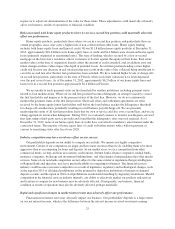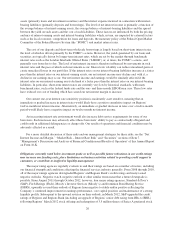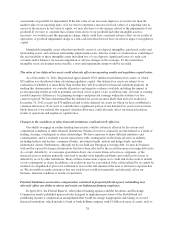Regions Bank 2012 Annual Report Download - page 34
Download and view the complete annual report
Please find page 34 of the 2012 Regions Bank annual report below. You can navigate through the pages in the report by either clicking on the pages listed below, or by using the keyword search tool below to find specific information within the annual report.We cannot predict whether, as a result of an adverse change in economic conditions or other reasons, the
FDIC will in the future further increase deposit insurance assessment levels. For more information, see the
“Deposit Administrative Fees” section of Item 7. “Management’s Discussion and Analysis of Financial
Condition and Results of Operation” of this Annual Report on Form 10-K.
FICO Assessments. In addition, the Deposit Insurance Funds Act of 1996 authorized the Financing
Corporation (“FICO”) to impose assessments on DIF applicable deposits in order to service the interest on
FICO’s bond obligations from deposit insurance fund assessments. The amount assessed on individual
institutions by FICO will be in addition to the amount, if any, paid for deposit insurance according to the FDIC’s
risk-related assessment rate schedules. FICO assessment rates may be adjusted quarterly to reflect a change in
assessment base. Regions Bank had a FICO assessment of $7 million in FDIC deposit premiums in 2012.
Acquisitions
The BHC Act requires every bank holding company to obtain the prior approval of the Federal Reserve
before: (1) it may acquire direct or indirect ownership or control of any voting shares of any bank or savings and
loan association, if after such acquisition, the bank holding company will directly or indirectly own or control
5 percent or more of the voting shares of the institution; (2) it or any of its subsidiaries, other than a bank, may
acquire all or substantially all of the assets of any bank or savings and loan association; or (3) it may merge or
consolidate with any other bank holding company. Financial holding companies and bank holding companies
with consolidated assets exceeding $50 billion must (i) obtain prior approval from the Federal Reserve before
acquiring certain non-bank financial companies with assets exceeding $10 billion and (ii) provide prior written
notice to the Federal Reserve before acquiring direct or indirect ownership or control of any voting shares of any
company having consolidated assets of $10 billion or more. Bank holding companies seeking approval to
complete an acquisition must be well-capitalized and well-managed.
The BHC Act further provides that the Federal Reserve may not approve any transaction that would result in
a monopoly or would be in furtherance of any combination or conspiracy to monopolize or attempt to
monopolize the business of banking in any section of the United States, or the effect of which may be
substantially to lessen competition or to tend to create a monopoly in any section of the country, or that in any
other manner would be in restraint of trade, unless the anticompetitive effects of the proposed transaction are
clearly outweighed by the public interest in meeting the convenience and needs of the community to be served.
The Federal Reserve is also required to consider the financial and managerial resources and future prospects of
the bank holding companies and banks concerned and the convenience and needs of the community to be served.
Consideration of financial resources generally focuses on capital adequacy, and consideration of convenience and
needs issues includes the parties’ performance under the CRA, both of which are discussed below. The Federal
Reserve must also take into account the institutions’ effectiveness in combating money laundering. In addition,
pursuant to the Dodd-Frank Act, the BHC Act was amended to require the Federal Reserve to, when evaluating a
proposed transaction, consider the extent to which the transaction would result in greater or more concentrated
risks to the stability of the United States banking or financial system.
Depositor Preference
Under federal law, depositors and certain claims for administrative expenses and employee compensation
against an insured depository institution would be afforded a priority over other general unsecured claims against
such an institution in the “liquidation or other resolution” of such an institution by any receiver.
Incentive Compensation
Guidelines adopted by the federal banking agencies pursuant to the FDIA prohibit excessive compensation
as an unsafe and unsound practice and describe compensation as excessive when the amounts paid are
unreasonable or disproportionate to the services performed by an executive officer, employee, director or
principal stockholder.
18


